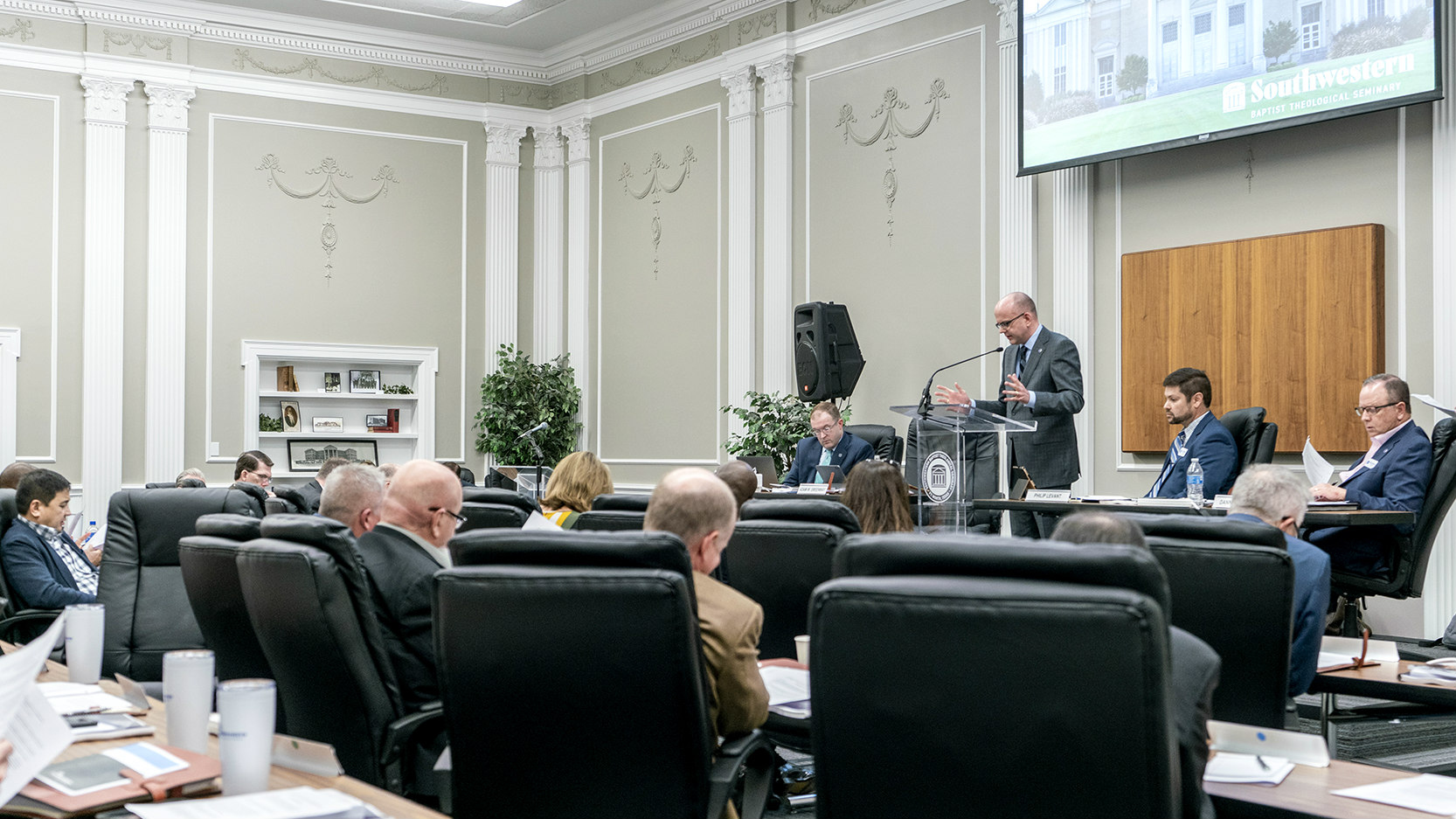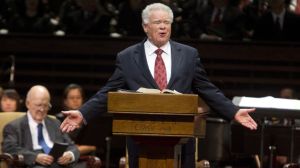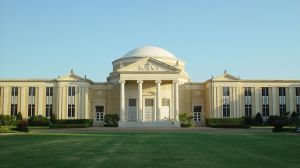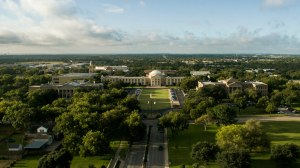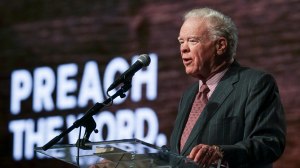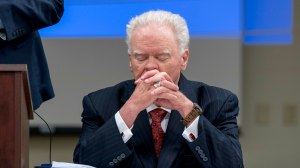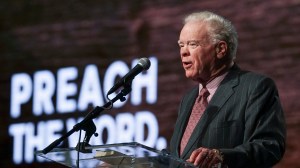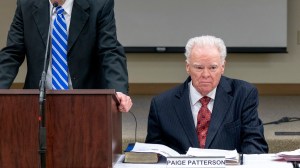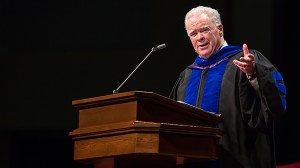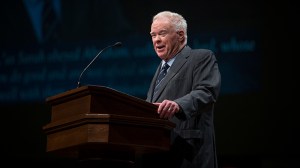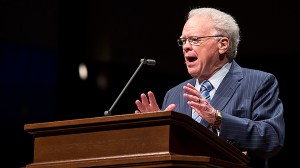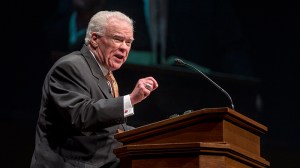In this series
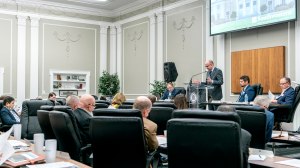
Southwestern Baptist Theological Seminary’s newly inaugurated president Adam Greenway has focused on mending strained relationships and building new ones among its Southern Baptist constituency. Yet the Texas seminary’s challenging relationship with former president Paige Patterson continues to make that task difficult.
The latest round of strain between Southwestern and Patterson centers around a former Patterson associate’s draft email advising a donor on how to request Southwestern return funds he had given to the school. The May 2019 message from former Patterson chief of staff Scott Colter had been inadvertently sent to an inactive Southwestern email address for Patterson’s wife Dorothy and was shown to trustees during their October 21–22 meeting in Fort Worth.
The email included criticism of two female professors at Southwestern, prompting a response from the faculty, and was interpreted by some as evidence Patterson has attempted to siphon donor funds away from the seminary since his departure a year ago, a charge he denies.
Paige Patterson was terminated by trustees in May 2018 amid financial and enrollment challenges as well as charges he mishandled allegations of sexual abuse at the two SBC seminaries he has led.
This latest skirmish occurred in the context of what The Wall Street Journal has called a “generational divide” among evangelicals broadly and Southern Baptists in particular.
Among many Southern Baptists, Patterson, 77, is well-known for his role in turning America’s largest Protestant denomination back to its conservative theological roots 40 years ago. Yet he has been criticized by younger generations in particular—some of whom hadn’t been born when he helped lead the SBC’s Conservative Resurgence—for his alleged mishandling of abuse claims and insensitivity toward women.
Amid that milieu, current Southwestern president Adam Greenway, 41, is attempting to attract a new generation of students to reverse enrollment declines while not alienating Baby Boomer donors.
Fundraising at Southwestern has “taken a hit” since Patterson’s departure, the WSJ reported, leaving a $3 million budget deficit when Greenway, previously a dean at the Southern Baptist Theological Seminary, arrived in Fort Worth in February. Yet new student enrollment is up 33 percent this fall following a 35 percent drop over Patterson’s 15-year tenure.
Diverting donor funds?
Colter said his now-controversial email came in response to questions from donor James Merritt of South Carolina, who “felt his gift” to fund the Dorothy Kelley Patterson Chair of Women’s Studies “was not being used by SWBTS as he intended” since the chair sat vacant. (Candi Finch, who formerly held the chair, was terminated last October. She was considered a Patterson supporter.)
Colter’s proposed reply to Merritt claimed Southwestern professors Terri Stovall and Katie McCoy are not qualified to fill the chair, though he told Christianity Today he did not intend to disparage their teaching or scholarship.
“SWBTS now does not have a systematic theologian trained in complementarianism and feminism to occupy this chair or teach necessary courses,” Colter wrote in the email, adding that some “concerning” social media posts suggest McCoy “is not ready to fulfill this chair adequately” while Stovall “is not academically qualified to teach the associated courses in theology.”
After the email was published online by a blogger, the faculty responded in their defense with a unanimous resolution in support of Stovall and McCoy. The statement commended “their theological orthodoxy, their contribution to scholarship, their positive conduct during trying times, and their Christ-like leadership within the seminary community.”
Greenway affirmed the faculty resolution via Twitter, as did trustee chairman Philip Levant.
Systematic theology professor Malcolm Yarnell proposed the resolution during a faculty meeting October 23 because of his “absolute confidence in both” Stovall, professor of women’s ministries, and McCoy, assistant professor of theology in women’s studies, he told CT. When Colter’s email surfaced, “the faculty immediately began to rally around our colleagues, with numerous professors expressing support for the idea of a resolution.”
Colter said he concurs “with the kind sentiments expressed toward [Stovall and McCoy] by the SWBTS faculty” and has “expressed that personally to them both in recent days.”
In addition to seeing the email as an attack against Stovall and McCoy, Southwestern also saw it as an attempt by the Pattersons to divert donor funds.
“It is unfortunate that this type of behavior has characterized the previous administration since their termination,” said Colby Adams, Southwestern’s vice president for strategic initiatives. “The fact is that every attempt to redirect donor funds away from the seminary adds to the financial burden our students have to bear in tuition and fees.”
In comments to The Wall Street Journal, which Patterson shared with CT, he said Southwestern “has lost a large number of donors because of the course they followed,” beginning with his termination and followed by other decisions like the removal of stained glass windows commemorating the SBC’s Conservative Resurgence. Yet every donor “will tell you that they have never been advised by me or my family to cease gifts to Southwestern. In fact, we have continued our efforts to raise funds for Southwestern.”
This summer, Southwestern distanced itself from its former president in a response to a sexual assault lawsuit filed by a former student, stating that Patterson “was not in the course and scope of any alleged employment” in the circumstances named in the complaint.
Building Bridges
Meanwhile, Greenway, 41, says he is casting a vision for a unified Southwestern community that welcomes anyone who aligns with the seminary’s core commitments to a high view of Scripture, confessional fidelity to the Baptist Faith and Message 2000, the Great Commission, and cooperation.
As part of that vision, Greenway has reached out to Baptists of various theological tribes in Texas, including the more moderate Baptist General Convention of Texas (BGCT) and the more conservative Southern Baptists of Texas Convention (SBTC).
In an interview with the BGCT’s Baptist Standard, he said faculty members at Southwestern must adhere to the concept of biblical inerrancy, as defined in the Chicago Statement on Biblical Inerrancy, but use of the term “inerrancy” is not required by those for whom it has become “politically weaponized and personally problematic.”
Also asserting solidarity with the SBTC, Greenway spoke during an October 29 SBTC breakfast in Odessa of a “beautiful partnership” between Southwestern and the SBTC to help churches in need of revitalization.
As Greenway builds bridges to various tribes of Baptists, he has also apologized for missteps in Southwestern’s past, pledged to bring multiple generations of believers together in partnership, and reaffirmed the seminary’s commitment to train women “for every right calling within our complementarian convictions.”
Southwestern “has not always been the place that has brought about the kind of hope and healing and unity that ought to characterize the New Testament people of God,” Greenway said in his October 21 inaugural address. “For any way in which we have fallen short, I am sorry and I apologize.”
Patterson said of Greenway, “Every man is entitled to his own view of my work, and I wish Dr. Greenway only God’s best.”
David Roach is a writer in Nashville, Tennessee.

